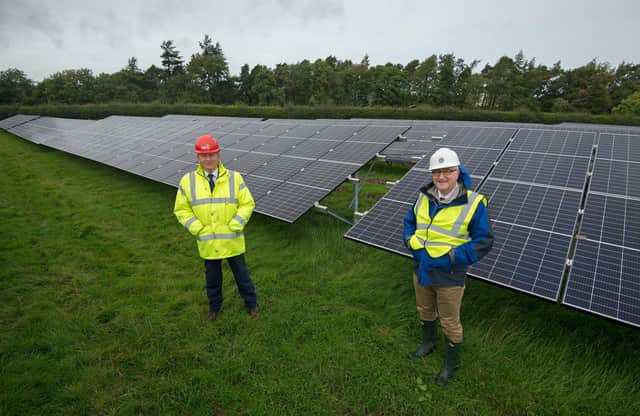Edinburgh University builds solar farm the size of five football pitches on campus


Work has begun on a huge, groundbreaking solar farm on an Edinburgh University campus.
The five-hectare farm at the Easter Bush campus in Midlothian will be one of the first solar farms to be built on a university campus.
Advertisement
Hide AdAdvertisement
Hide AdComprising 5,000 solar panels, it is expected to save the university up to £200,000 a year in electricity costs.
Work to install the panels has now begun, and is expected to finish in November.
Once completed the site – as big as five football pitches – will be connected to the world-renowned
Royal (Dick) School of Veterinary Studies and the Roslin Institute.
Advertisement
Hide AdAdvertisement
Hide AdIts photovoltaic (PV) panels are expected to generate more than 1,400,000 kWh of electricity a year,
which is roughly the same as that needed to supply 500 typical homes.
This will provide around 15 percent of the electricity needed by Edinburgh University’s Easter Bush campus, bringing the university closer to its goal of becoming carbon neutral by 2040.
Together with existing generation capacity, 60 per cent of Easter Bush’s electricity, and 30 per cent of its
Advertisement
Hide AdAdvertisement
Hide Adheat, will be generated on site from low or zero-carbon technologies.
The Easter Bush development includes a ‘living laboratory’ for solar PV research, enabling researchers to
investigate improved methods of generating green power.
Edinburgh university was an early adopter of PV technology. The first panels were installed at its
King’s Buildings campus in 2007, and have since generated nearly 1,000MWh.
Advertisement
Hide AdAdvertisement
Hide AdSolar installations at the university have generated an average of 265MWh of electricity per year in recent years.
The Easter Bush solar farm will increase this to an average of 4,500 MWh per year, saving more than 1,000 tonnes of carbon emissions each year.
Its aim to become carbon neutral by 2040 is part of the university’s commitment to social and civic responsibility and to meeting the UN’s Sustainable Development Goals.
Dave Gorman, the Director of Social Responsibility and Sustainability at Edinburgh University, said: “The University of Edinburgh has invested more than £20 million in low-carbon energy in recent years, which has reduced its overall CO2 emissions by almost 10,000 tonnes annually.
Advertisement
Hide AdAdvertisement
Hide Ad"The solar farm at Easter Bush will not only allow us to lead the way in the practical implementation of such technology, but research the next generation of low-carbon energy.”
Edinburgh University’s Easter Bush Campus is located eight miles to the south of the city centre, near Penicuik.
It incorporates both The Royal (Dick) School of Veterinary Studies and The Roslin Institute.
The area was once agricultural land, and was initially used by the university for practical tuition of veterinary students with livestock.
Advertisement
Hide AdAdvertisement
Hide AdA field station was opened in 1962, and a number of buildings were added until in 2005 the university approved plans to relocate all veterinary school teaching to the campus.
In 2011 the William Dick Building and Roslin Institute building were opened on the campus.
The Roslin Institute was formerly housed in the village of Roslin, where the cloning of Dolly the Sheep took place.